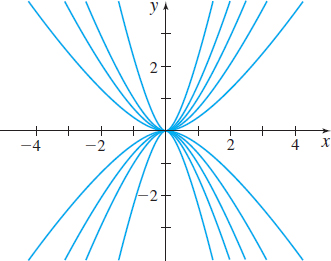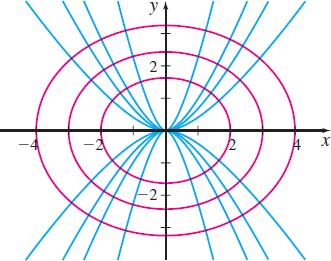EXAMPLE 5Finding a Family of Orthogonal Trajectories
Find the family of orthogonal trajectories for the one-parameter family y2=Cx3. See Figure 3 for several graphs in the family.

Figure 3 y2=Cx3
Solution
Step 1 We differentiate y2=Cx3 with respect to x. 2yy′=3Cx2
Then we eliminate C using this equation and the equation y2=Cx3 of the family. Since C=y2x3, we find 2yy′=3y2x3x2y′=3y2x
Step 2 Now we replace y′ with −1y′, to obtain the differential equation for the family of orthogonal trajectories. −1y′=3y2xy′=−2x3y
1068

Figure 4 
Blue: y2=Cx3;
Pink: x2+32y2=k
Blue: y2=Cx3;
Pink: x2+32y2=k
Step 3 The differential equation dydx=−2x3y is separable and can be written as 2xdx+3ydy=0
The general solution is x2+32y2=K
The orthogonal trajectories for the family y2=Cx3 is a family of ellipses x2+32y2=K, as shown in Figure 4.

